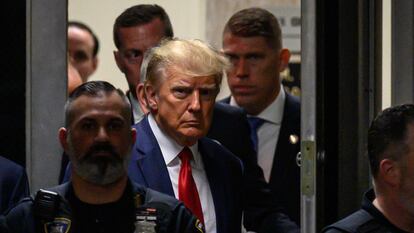Can Donald Trump be president after his third indictment? What if he is convicted?
The US Constitution does not contemplate barring someone who has been indicted or convicted of a federal crime from running or serving a term in office


In the United States, a country forged by precedent, there are precedents even for Donald Trump, whose presidency broke all the molds. To answer questions that are recurrent these days in Washington — whether he will be able to run for the 2024 elections, and whether he can move into the White House for a second time if he wins and any of the three indictments prosper — you need to go back more than a century, to the obscure case of a candidate named Eugene Debs. Debs campaigned in 1920 from prison. He aspired to lead the country as a member of the Socialist Party of America while serving time for violating the Espionage Act of 1917 by making speeches critical of the United States’ role in World War I. He only got a million votes. The Republican Warren Harding won by a landslide.
The U.S. Constitution not only does not prevent Trump from running for office, it also does not contemplate barring the winner from serving even if this individual has been convicted of a federal crime, not even if they are already behind bars — unless the conviction was for a very specific crime: insurrection. It is food for philosophical debate whether the role of the former president in the storming of the U.S. Capitol on January 6, 2021 falls within the limits of that definition. In terms of the judicial discussion, that possibility has been ruled out: Trump has not been accused of this crime in any of the three indictments he is facing at the moment.
There is, of course, no mention of this crime in the first indictment, announced in April by the Manhattan district attorney, the Democrat Alvin Bragg, for allegedly falsifying business records to cover up the payment of hush money by the former president’s lawyers to the porn actress Stormy Daniels, with whom, according to her, Trump had an extramarital affair that he denies. The crimes of which he is accused in New York are not federal. Nor has Trump been accused of insurrection in the third indictment, made public on Tuesday, for his alleged attempts to subvert the legitimate results of the November 2020 election in Georgia, reinforcing his role as instigator of the assault on the Capitol. This time, a Washington grand jury has charged him with conspiracy to defraud the United States, obstruction and conspiracy to obstruct official proceedings, and conspiracy against the right to vote and to have one’s vote counted.
Insurrection is also not among the 37 crimes detailed by Special Counsel Jack Smith, appointed by the Department of Justice, in the second indictment against Trump announced in June over the confidential documents that the former president took without permission from the White House to his private residence in Mar-a-Lago, Florida. Prosecutors charged him with 31 counts of violating the Espionage Law, for intentionally withholding national defense information contained in as many documents; three more counts for keeping and hiding papers from federal investigations; two more for falsehood; and the last, for conspiracy to obstruct justice with one of his employees, Walt Nauta. Smith added additional charges to the list this Thursday: obstruction of justice and intentional withholding of classified information, for his attempts to delete security camera footage showing how Nauta moved the boxes around the mansion on orders from the former president.

The provision of preventing an insurgent from becoming president is contemplated in the 14th Amendment of the Constitution. Approved in 1868, it is famous for being the one that granted citizenship to every person “born or naturalized in the United States,” also those who had been enslaved, and for guaranteeing equal rights to all citizens before the law. Likewise, it prohibited the person involved in a revolt from holding any civil, military or elected position without the approval of two-thirds of the House of Representatives and the Senate. Both majorities seem like a utopia in the United States of 2023, a country cleanly split in half.
“That amendment was drafted shortly after the Civil War, and was designed to instruct the Confederate rebels, who rose up against Abraham Lincoln,” New York lawyer Kevin O’Brien explained in a telephone conversation with EL PAÍS. Specializing in corruption crimes, O’Brien was Assistant U. S. Attorney in the Department of Justice in the days of Ronald Reagan.
Decorum rules
Historian Russell L. Riley, co-director of the Miller Center for Presidential Oral Histories at the University of Virginia in Charlottesville, agrees that the law does not preclude Trump from running in a campaign where he is currently the favorite to win the Republican nomination and will likely face off with Joe Biden again. “But it is mostly because nobody could have foreseen a situation like this. Trump is a president whose behavior simply exceeds all the rules of decorum that those in that position are expected to have.”
Political analyst Robert Reich, who was Secretary of Labor in the Bill Clinton Administration from 1993 to 1997, wrote this week in his influential newsletter Substack that someone who has tried to overthrow the government of the United States cannot be president.
The truth is that the bipartisan committee that investigated his role in the assault on the Capitol for 18 months wrote a voluminous report after questioning 1,000 witnesses and reviewing more than 100,000 documents, in which it proposed that he be charged with four crimes, including incitement to insurrection. They also unanimously suggested that he be disqualified from holding any public office.
Special Counsel Jack Smith has in many ways picked up the gauntlet of those nine congressmembers (seven Democrats and two Republicans), but he hasn’t gone so far as to heed the disbarment recommendation. Attorney General Merrick Garland appointed him last November to allay suspicions that the legal prosecution may actually be masking, as Trump maintains and his supporters believe, a political “witch hunt.”
This caution is also reflected in the procedural deadlines. The trial in the Stormy Daniels case will not start until March, if there are no delays. That is, two months after the start in Iowa of the primaries. March 5 is Super Tuesday, a decisive day for the primaries. Judge Aileen Cannon, in charge of directing the work of the Florida grand jury that will try Trump for his handling of the Mar-a-Lago papers, has set the start of that case for May 20. This is (and, again, if there are no delays), just two months before the Republican convention in which the party will choose its candidate in Milwaukee (Wisconsin).
If Trump is selected as the Republican nominee and wins the presidential election, Americans who think that a president cannot serve in the midst of so much judicial trouble or from prison, would be left with few options other than another impeachment (the third to which he would be subjected) or even pressing the “nuclear button” of the 25th Amendment, which allows the Cabinet to remove a president who cannot carry out his duties. There are two other options: a pardon by Biden or by Trump himself.
Sign up for our weekly newsletter to get more English-language news coverage from EL PAÍS USA Edition
Tu suscripción se está usando en otro dispositivo
¿Quieres añadir otro usuario a tu suscripción?
Si continúas leyendo en este dispositivo, no se podrá leer en el otro.
FlechaTu suscripción se está usando en otro dispositivo y solo puedes acceder a EL PAÍS desde un dispositivo a la vez.
Si quieres compartir tu cuenta, cambia tu suscripción a la modalidad Premium, así podrás añadir otro usuario. Cada uno accederá con su propia cuenta de email, lo que os permitirá personalizar vuestra experiencia en EL PAÍS.
¿Tienes una suscripción de empresa? Accede aquí para contratar más cuentas.
En el caso de no saber quién está usando tu cuenta, te recomendamos cambiar tu contraseña aquí.
Si decides continuar compartiendo tu cuenta, este mensaje se mostrará en tu dispositivo y en el de la otra persona que está usando tu cuenta de forma indefinida, afectando a tu experiencia de lectura. Puedes consultar aquí los términos y condiciones de la suscripción digital.
More information
Archived In
Últimas noticias
Welcome to the post-religion era: The idea of Christianity as the absolute truth has become obsolete
‘I thought you would like it’: The risky sexual practice popularized by TV shows and TikTok
The digitalization of tourism: ‘They promise experiences and gave us the worst possible one’
Mexican peso defies uncertainty with forecasts of a new period of stability in 2026
Most viewed
- Sinaloa Cartel war is taking its toll on Los Chapitos
- Oona Chaplin: ‘I told James Cameron that I was living in a treehouse and starting a permaculture project with a friend’
- Reinhard Genzel, Nobel laureate in physics: ‘One-minute videos will never give you the truth’
- Why the price of coffee has skyrocketed: from Brazilian plantations to specialty coffee houses
- Silver prices are going crazy: This is what’s fueling the rally










































